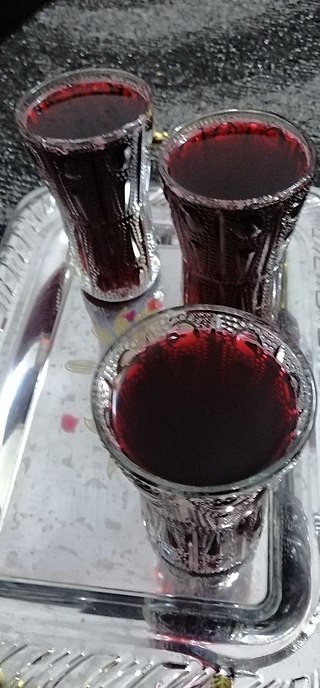Top Qs
Timeline
Chat
Perspective
Karkadeh
Hibiscus beverage consumed in Egypt From Wikipedia, the free encyclopedia
Remove ads
Karkadeh (Arabic: كركديه) is a traditional beverage made in Egypt and Sudan by infusing dried petals from the roselle flower in water. Renowned for its deep red color and tart flavor, karkadeh can be enjoyed both hot and cold, serving as a refreshing drink across various seasons.[1][predatory publisher][2][3]
Roselle may have been first domesticated in western Sudan, possibly as early as 4000 BC.[1][predatory publisher]
Remove ads
Preparation
To prepare karkadeh, dried roselle petals are combined with water and brought to a boil. The mixture is then simmered for an additional 5 to 10 minutes to extract the full flavor of the roselle. After boiling, the liquid is strained to remove the petals, and sugar is added to achieve the desired sweetness. Once cooled, the beverage can be refrigerated and served chilled, often garnished with fresh mint leaves or a slice of lime.[4]
Alternatively, karkadeh can be prepared using a cold brew method. In this approach, dried roselle petals are soaked in cold water and left to steep overnight. The following day, the mixture is strained, sweetened to taste, and served chilled over ice. This method yields a milder flavor compared to the traditional boiling technique.[5]
In Egypt, dried roselle is commonly available in tea bags, which are convenient for making a quick cup of hot roselle tea but often result in a milder flavor compared to the traditional method.[6]
Remove ads
Cultural significance
Summarize
Perspective

Karkadeh holds a prominent place in Egyptian social and cultural practices. Traditionally, it is served during wedding celebrations, symbolizing joy and prosperity. The beverage is also popular during the holy month of Ramadan, where it is commonly consumed to break the fast.[7]
Many locals unsubstantially associate karkadeh with ancient Egyptian traditions. It is believed that the drink was favored by the pharaohs and has been consumed for centuries due to its perceived health benefits. This traditional belief has led to karkadeh being affectionately termed the "tea of the pharaohs", underscoring its enduring presence in modern Egyptian culture.[7]
The beverage is widely available throughout Egypt, from street vendors to traditional cafés, reflecting its integral role in Egyptian social life. In Islamic communities, where alcohol consumption is limited, karkadeh serves as a popular non-alcoholic alternative during celebrations and gatherings.[7]
The preparation of karkadeh involves soaking dried roselle petals, a practice that has become a cherished ritual in Egyptian households. This process not only enhances the flavor but also fosters a sense of community as family members participate in the preparation and consumption of the beverage.[7]
Remove ads
Nutrition
Karkadeh is rich in antioxidants and vitamin C, offering potential health benefits. Studies have indicated that regular consumption of roselle tea may help in lowering blood pressure and cholesterol levels. Additionally, its diuretic properties can aid in digestion and weight management.[8]
See also
References
Wikiwand - on
Seamless Wikipedia browsing. On steroids.
Remove ads

